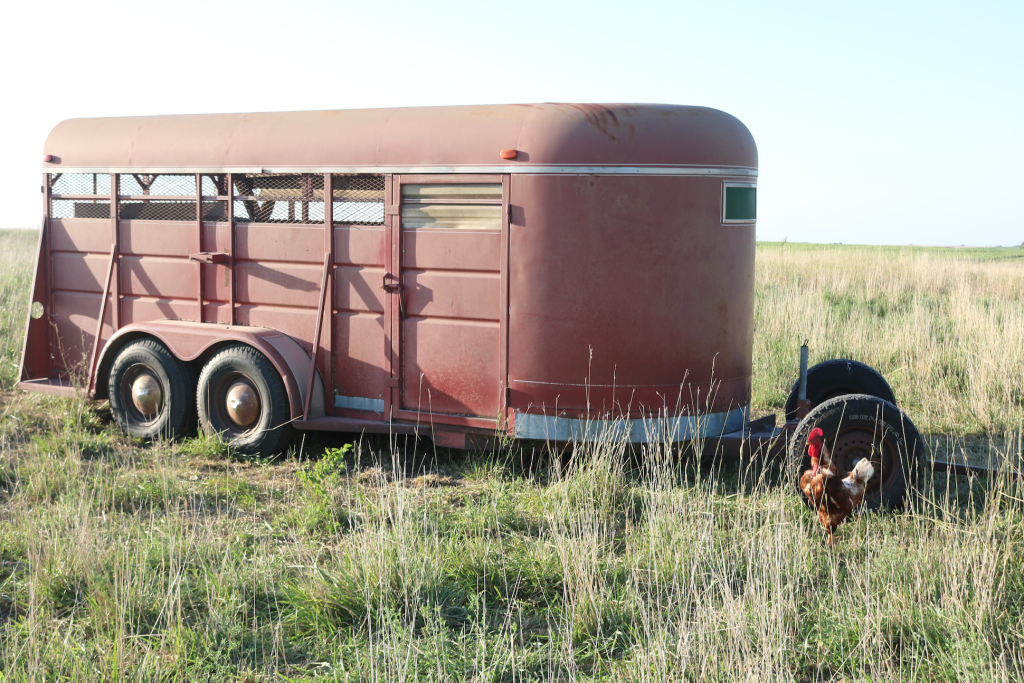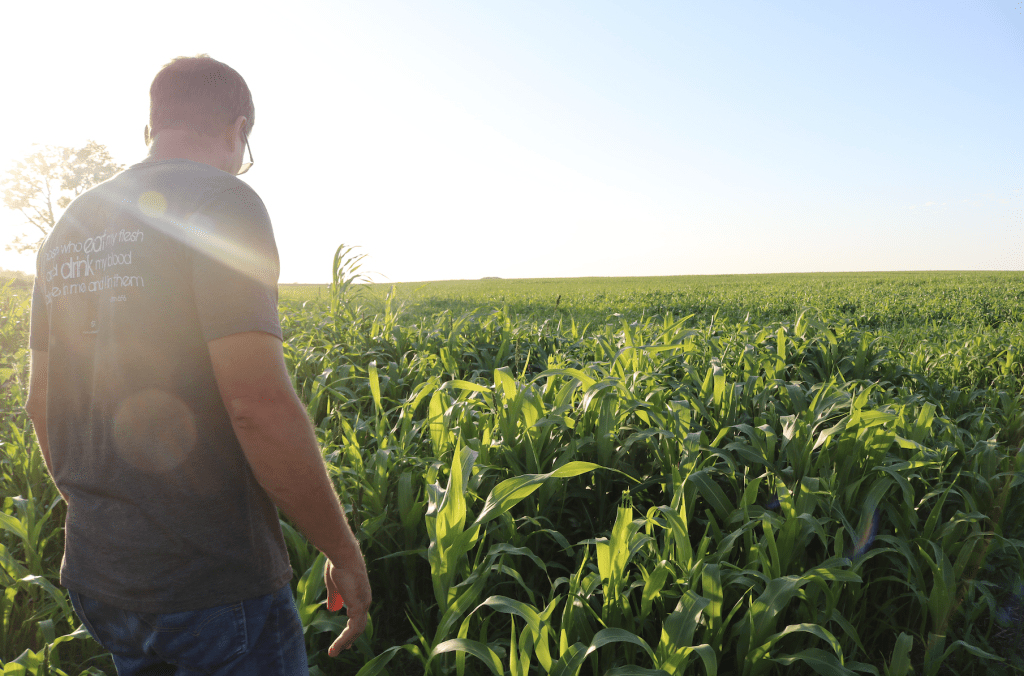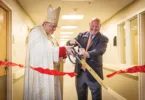
by Marc and Julie Anderson
mjanderson@theleaven.org
AXTELL — You are what you eat.
Those words appear on the front of one of Bill Buessing’s favorite T-shirts.
While the back of the T-shirt features a Scripture passage taken from the eucharistic discourse in the Gospel of St. John, the shirt also refers to Buessing’s philosophy of farming.
Buessing, a member of St. Michael Parish in Axtell (pop. 407), along with his wife Sandy, farms 460 acres of land in Marshall County in the far northwest corner of the archdiocese in the Nemaha-Marshall Region. In fact, seven miles farther north from the Buessing farm lies the Nebraska state line.
As a regenerative farmer, Buessing practices a style of farming that works with natural resources instead of concentrating on high-yield crops that damage or destroy natural resources in the process. Some of the methods he employs regularly include rotating the pastures on which his cows and sheep graze, planting cover crops and using minimal chemicals.

For example, Buessing’s corn field (planted with only non-GMO corn) relies upon 40 pounds of nitrogen fertilizer as opposed to 150 to 200 pounds.
He is also a big proponent of no-till farming, meaning he does not disturb the soil with machines like plows and cultivators, saving him thousands of dollars in labor and fuel while relying upon natural processes to break down any residue from the previous crop.
Buessing also engages in the use of cover crops. In fact, they are a staple on his farm.
“If you have a cooler crop system, you’ll have a healthier plant,” he said, adding that sometimes cover crops can lower the temperature by 20 to 30 degrees.
“I honestly believe you are what you eat, and I believe that in regard to the soil, too. You’ve got to feed the soil to get its nourishment,” he said.

Walking through one of his fields, Buessing pointed out the vast variety of plants found in just one little patch of land — at least 25 to be exact.
“There’s a big diversity out here,” Buessing said, pointing to his cover crops of spring peas, sunflowers, buckwheat and millet. “Soil biology is just as important as the chemical biology of your soil. . . . Planting a diverse cover crop benefits the soil biology. It feeds the soil underneath, which, in turn, feeds your crops. . . . We’re just at the tip of the iceberg of understanding soil biology.”
Buessing didn’t always farm full time. Although he grew up on a farm in the area, he worked for 19 years as a lineman for Nemaha-Marshall Electric Company and farmed part time. In 2013, he decided to quit his job and return to farming full time and expand on the regenerative farming methods he’d been using since the ’90s.
Today, he continues to stay current with the latest in regenerative farming by reading, attending seminars and talking with other farmers.
“It evolves,” Buessing said. “I do things differently today than five years ago, and I’m trying new things all the time.
“You have to come up with ways to have cash flow and make farm payments and everything else. So, this was a way I could do it. I’m sure living right now, cash flowing and stuff, having an off-the-farm job would definitely be better. But long-term, I like this, and the health of the soul is definitely improving.”

One notable feature of the Buessing family farm is that of a chicken mobile, which allows the chickens to move freely on the range, but also go inside the trailer for shade. Made from a single livestock trailer, Buessing hollowed out the bottom, allowing the chickens to do their business directly onto the ground.
“Basically, they go out the bottom. I can move it, and then I don’t have to scrape out a chicken house,” he said. “And they’re out here eating bugs and insects or whatever, and they’re eating grain, too.
“Every farmer is trying to do the right thing from their perspective.”
Buessing also raises grass-fed steers, something two of his customers truly appreciate.

Currently, these customers — one who is allergic to corn; the other to grain — purchase grass-fed beef from his farm, and both of them are able to enjoy the meat without having to worry about having an allergic reaction.
“Locally grown food in ways like this, to me, is going to be healthier,” he said.
Buessing said if people started paying more attention to the food they eat, they’ll be less likely to need medicine and they’ll lead overall healthier lives.
“Regenerative farming, if done properly, can improve the soil health, soil biology, which will, in turn, improve nutrient uptake or nutrient density in the plants that we consume or in the plants the animals consume.”
Overall, Buessing said humanity should be cooperating with God and nature.
“Mother Nature is pretty smart,” he said. “We try to fight her a lot, but when you try to work with nature, things seem to go better.”






